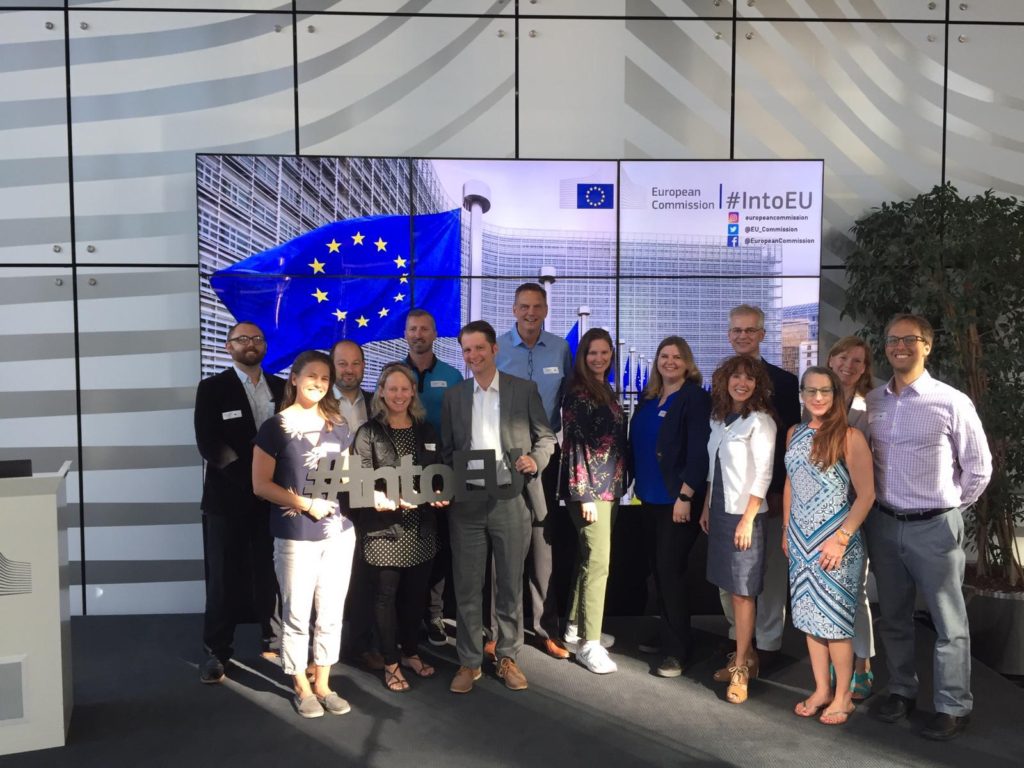Green Capitals Study Tour June 2019: by Laurel Creech, Nashville, TN

This past June I was honored to be one of twelve delegates from the U.S. to tour leading European cities focused on their efforts to address climate change. The experience was a highlight of my career in sustainability and raised my level of setting a bar on what we as local U.S. cities can and should be aiming towards because the planet can’t afford not to.
Climate change is considered a crisis in the cities we visited and the level of urgency, passion and commitment was contagious. As the Mayor of Oslo said, “Climate change can not be left to someone else, somewhere else, for some other time.”
The tour was hosted by the European Union to promote transatlantic relationships in urban planning aimed at promoting a lower carbon future on both sides of the Atlantic. The delegation began in Brussels, Belgium and made stops at the Port of Antwerp; the city of Nijmegen, Netherlands; and Oslo, Norway timed with the 2019 European Green Capitals award ceremony. The study tour also visited the European Commission – the executive body of the European Union – where we discussed policy with EU officials on climate impact and energy efficiency across the continent. The intent of the trip was for our country to learn about the EU’s leading innovative urban planning and their regional efforts with the hope that they can be replicated across the world in a collective drive for climate action.
There are so many impressive learnings from the trip. Here are some highlights:
- The EU has dedicated $1.7 billion dollars (€1.5 billion) to European cities for sustainable urban development between 2014 and 2020 for projects that help cities to reduce emissions, protect the environment, and create sustainable transportation solutions.
- Common themes in all the cities we visited included a strong strategy around a circular economy, an aggressive plastics reduction strategy, detailed 2030 climate frameworks, climate neutrality plans and clean mobility.
- In Brussels, there is a commitment to passive building design, mandatory net zero government facilities by 2021, and buildings being constructed/ renovated to house only 80% of the employees.
- Nijmegen, Netherlands has the most aggressive transit and active transportation infrastructure where most of the city has been transitioned to roads where cars are considered the guests. The city also is decommissioning their coal power plant and its two-year-old wind park, created through direct citizen investment and ownership, already has generated enough electricity to power 10 percent of the city’s homes.
- Autonomous and electric vehicles were the highlights in Oslo, Norway. They have mico-mobility autonomous buses where both citizens and visitors use. They also have an electric vehicle “bunker” for free EV charging to 86 vehicles. The cars are set-up on pods of 6 and the charger is smart enough to identify the lowest charged vehicle(s) so it can prioritize charging those first. As the guide shared with us, “the bomb shelter was used to protect people during WWII and now it is used to protect us against climate change”. Also impressive is that electric vehicles represented 76.6% of new car sales in Oslo for March sales (30% of sales annually and the number is increasing).
- Much of the commitment to climate change goals and mitigation was focused on people- human health and peace.
- Lastly, youth engagement and activism was a central component in each city. Greta Thunberg’s movement has started a tireless new generation focused on the urgency of climate change.
The tour culminated with the annual European Green Capitals Award in Oslo, Norway which is the 2019 winner. The European Green Capital Award aims to recognize the environmental achievements of European cities and to inspire others to take positive action in making their cities fit for life. The winning city hosts a full year of activities, tours, exhibits and events (like the Olympics) and it is a huge honor to achieve. The winning city in 2020 is Lisbon, Portgual and 2021 is Lahti, Finland.
In summary, I am energized, inspired and in awe of the incredible work of the EU. I am looking forward to integrating my learnings and sense of urgency to our planet in the work my team and I team are doing for a better tomorrow. As the Mayor of Oslo said it best, “We are the bridging generation- the first generation to see climate change firsthand and the last generation that can do something about it!”
Thank you to all the other participating sustainability peers on the tour:
- City of Aspen (Colorado)
- City of Cincinnati (Ohio)
- City of Fort Collins (Colorado)
- City of Fremont (California)
- City of Phoenix (Arizona)
- City of Portland (Oregon)
- City of Providence (Rhode Island)
- City of Richmond (Virginia)
- Metropolitan Washington (DC) Council of Governments
- State of Minnesota
- State of Tennessee